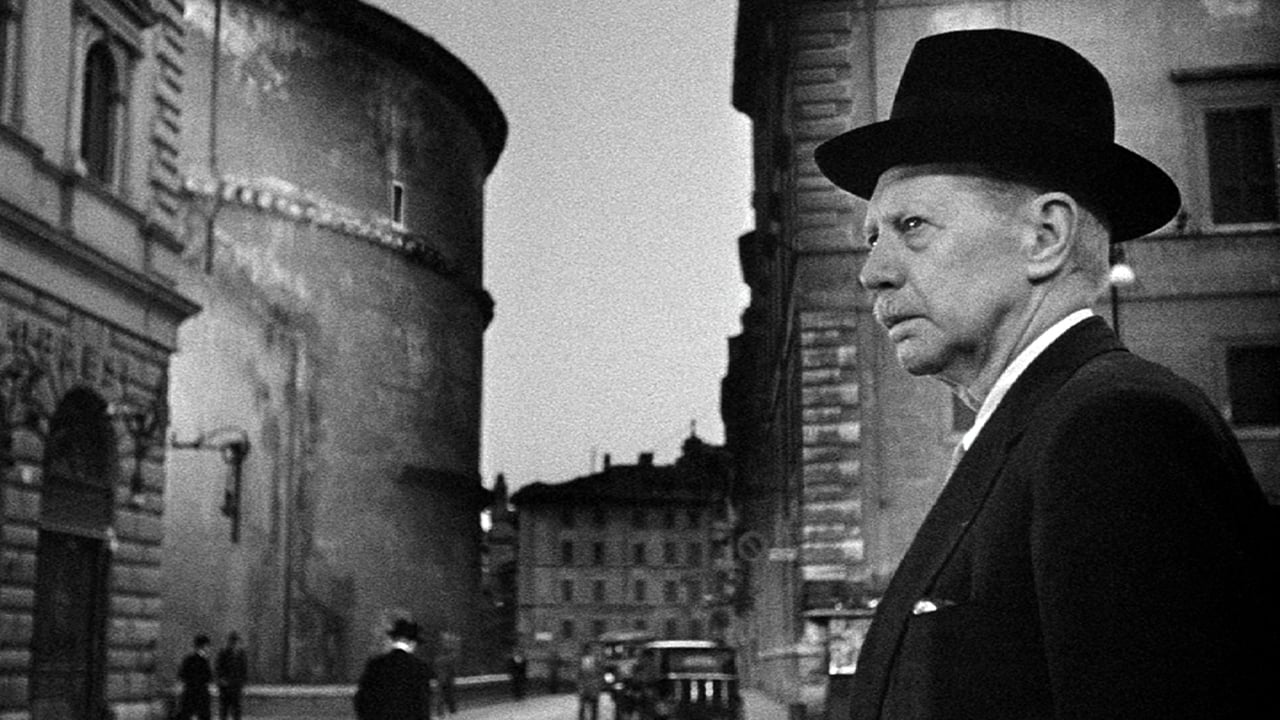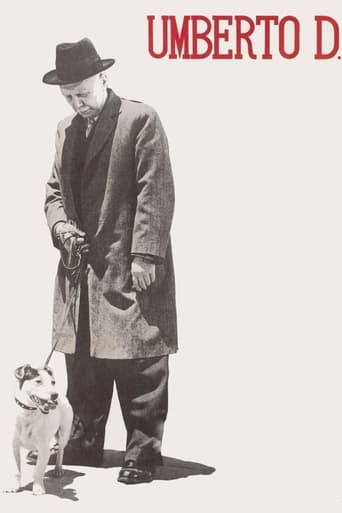

Wonderfully offbeat film!
... View MoreSERIOUSLY. This is what the crap Hollywood still puts out?
... View MoreIt's easily one of the freshest, sharpest and most enjoyable films of this year.
... View MoreIt is an exhilarating, distressing, funny and profound film, with one of the more memorable film scores in years,
... View MoreI absolutely hated "Ladri di biciclette" so I had my doubts about "Umberto D." but the improvement is noticeable immediately. The strokes of social, human commentary are much sharper, quicker, just better, and the characters far more memorable. After a couple of minutes I already knew I´d never forget the image of Maria fighting the ants, not to mention the Oscar-worthy performance of the dog. The tension slowly builds up as misfortunes keep happening to poor Umberto who´s a bit whining but full of charisma and dignity. De Sica surprisingly holds back his infamous taste for melodrama for quite a while and it all peaks in a predictable but inevitable scene lovely managed. At that point all my doubts had vanished and I was already questioning if this could be the best film ever about old age, or at least be a tie with "Make Way for Tomorrow".But then De Sica takes over. First there´s that zoom (are you serious, Vittorio?) then it´s just... He tries so hard to make everybody cry their hearts out it just didn´t work for me. He almost succeeds with the barking dog scene, I must admit, but yeah, my admiration went down a notch. Now, it really isn´t that bad, it´s still De Sica at his best. As one critic said "it´s cerebral and emotional, bleak but warm". It´s true. The final scenes are part of film history but I wish he had kept that simple itch until the end.
... View MoreUMBERTO D. is a movie in which we can recognize simple style, almost unbearable honesty, natural performance and empathy. Another gem of neo-realism. Retired civil servant faces life problems that his pension is not enough to rent rooms. The story shows his desperate efforts to try to find the money, where his only consolation provides his loyal dog. A lonely old man leads already lost battle for survival.One heartbreaking film about a lonely old man to whom every day is running out of a zeal and hope. Dog and maid were with him. The man in certain circumstances and faced with problems can not recognize beautiful word or a look of love. Money solves the problem, but money usually leads man to a certain extreme.Vittorio De Sica does not play with human emotions. He honestly shows emotions of his characters in certain circumstances. If I make this simple. This is actually a struggle for survival. On the face of the main character up close you can see the suffering and shame. Life losses often lead man astray, and he forgets what is actually all that matters. Tired, weak, defeated, humiliated, but dignified and lovable old man decides to tragic extremes. To me will always remain in the memory image of cheerful old man and a playful dog in autumn alley.Carlo Battisti as Umberto Domeniko Ferrari is the perfect image of human loneliness. Loneliness is not natural. Life is a struggle. Since it is not an actor by profession, this is a pretty good performance. Tired little bit of everything. Maria-Pia Casilio as Maria, the young maid, which despite her problems (pregnant and unmarried) gifts a kind word to her elder friend. I thought, in a certain part of the film, it may tend to develop a kind of relationship of a father figure and a girl in trouble. To my regret story went in the other direction. Her performance is impressive.
... View MoreAn elderly man (Carlo Battisti) and his dog struggle to survive on his government pension in Rome.Ingmar Bergman cited "Umberto D." as his favorite film, which seems appropriate considering it stands with Bergman's "Wild Strawberries" as one of the great portraits of old age and loneliness ever brought to the screen. According to Robert Osborne of Turner Classic Movies, this was De Sica's favorite of all his films, which really says something when the man made "Bicycle Thieves" (1948). The movie was included in "Time Magazine's All-Time 100 Movies" in 2005.Film critic Stuart Klawans says people today look at the film and love the "astringent" parts but dislike the dog. An unusual observation. Are people so cynical that they want the old man to be even without some sort of friend? Shame on them.
... View MoreI usually don't cry when I'm watching movies.I have seen many Hollywood movies that are usually considered tear-jerkers by the audience. And yet, most of them left me indifferent. I considered a couple of them to be pretty good, but I personally wasn't particularly moved by the scenes that were supposed to sad or emotional.However, this movie made me cry the first time I watched it."Umberto D." is a truly heartbreaking piece of filmmaking which I found to be even harsher in hindsight when I consider that a story like this could be happening in real life, at the same time when I'm watching this movie.And yet, despite being incredibly depressive, it is also immensely human.Vittorio De Sica doesn't exploit the misery of the main character in this movie. Instead of that, he is able to make, us the viewer, feel identified with him, see him as somebody close to our reality. And that's why this movie is so marvelous and have to be seen, even if it could a very sad and depressive experience.The ending is moving to enough to make any viewer cry.
... View More